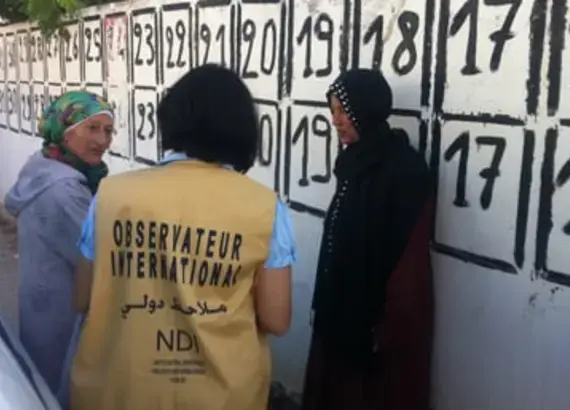
Success Story
Tunisian Election 'Extraordinary Achievement,' NDI Mission Finds
Tunisia’s 2011 constituent assembly elections are an “extraordinary achievement,” a milestone that is especially significant coming so shortly after the country emerged from decades of authoritarian rule, NDI said in a statement on Monday.
NDI observers noted a positive, sometimes festive atmosphere at polling centers, where they found trained poll workers, adequate procedures, and orderly lines in most locations. Long lines were found in most places due to extraordinary turnout, but most voters cheerfully waited their turn – there were reports of voters standing patiently for five hours or more.
The Institute found that political parties and candidates from across the spectrum largely expressed confidence in the independent election commission’s ability to organize an inclusive and credible election.
“Democracy does not have a nationality, just as human rights do not have a skin color,” said Alejandro Toledo, former president of Peru and co-leader of the delegation. “Yesterday a winner was chosen – democracy.”
The Institute fielded 47 accredited observers from 15 countries who deployed throughout the country for election day. The mission’s objective was to observe impartially every aspect of the election process – including the campaign, the casting and counting of ballots on election day, and the post-election period. The group included two long-term observers who worked across the country since Sept. 26 monitoring the pre-electoral environment and campaign period. The mission builds on NDI’s 25 years of experience observing more than 200 elections around the world including delegations in Morocco, Jordan, Lebanon, the West Bank and Gaza and Yemen.
The delegation was co-led by Toledo, former president of Peru; Jorge Fernando Quiroga, former president of Bolivia; Jane Harman, president of the Woodrow Wilson International Center and former U.S. congresswoman from California; Marwan Muasher, vice president of the Carnegie Endowment for International Peace and former minister of foreign affairs in Jordan; Ana Gomes, member of the European Parliament from Portugal; and Leslie Campbell, NDI regional director for Middle East and North Africa programs.
“While the interest in casting a vote in Tunisia’s first free election was a defining characteristic of this historic day, the challenges of managing the flood of voters led to some administrative shortcomings,” said the Institute.
Voters who missed the Aug. 14 registration deadline were told that they could vote at one of more than 900 special polling centers set up around the country. Many of the special centers were not prepared for the influx of voters and an SMS system created to tell unregistered voters where to vote crashed early in the day but was restored later.
“This is the first marker of a long process,” said Muasher. “The entire Arab world is paying attention to the process and outcomes of these elections.”
The delegation recommended the following actions to prepare for future Tunisian elections:
- Establishment of a permanent independent election commission to build on the experiences in this first election;
- Expansion of the current voter registry to include unregistered citizens who voted in special polling centers on election day, as well as overseas voters; and
- Revision of the current electoral law as adopted last April, with an emphasis on adopting measures to address laws and procedures that led to some inefficiency during this election.
“Tunisia is first. How this election is seen will influence events in Egypt, Libya and the entire region,” said Harman.
NDI’s international election observation mission was funded by a grant from the U.S. Agency for International Development (USAID). NDI programs in Tunisia are also supported by the Middle East Partnership Initiative (MEPI) and the U.S. Embassy in Tunis.
Related:
Published Oct. 24, 2011



